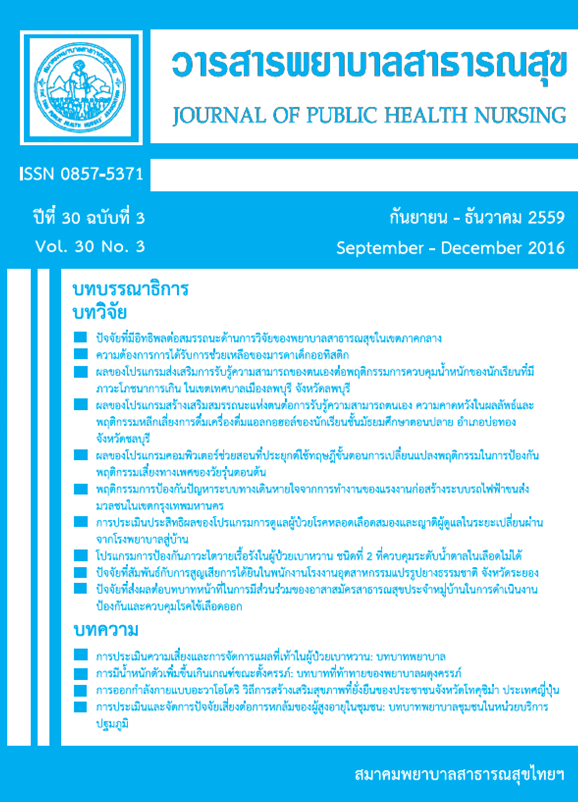ผลของโปรแกรมคอมพิวเตอร์ช่วยสอนที่ประยุกต์ใช้ทฤษฎีขั้นตอน การเปลี่ยนแปลงพฤติกรรมในการป้องกันพฤติกรรมเสี่ยงทางเพศของวัยรุ่นตอนต้น
Keywords:
พฤติกรรมเสี่ยงทางเพศ, โปรแกรมคอมพิวเตอร์ช่วยสอน, ขั้นตอนการเปลี่ยนแปลงพฤติกรรม, วัยรุ่นตอนต้น, Risky sexual behavior, CAI, The Transtheoretical model, Early adolescentsAbstract
การวิจัยครั้งนี้เป็นการวิจัยกึ่งทดลองเพื่อศึกษาผลของโปรแกรมคอมพิวเตอร์ช่วยสอนที่ประยุกต์ใช้ทฤษฎีขั้นตอนการเปลี่ยนแปลงพฤติกรรมในการป้องกันพฤติกรรมเสี่ยงทางเพศของวัยรุ่นตอนต้น กลุ่มตัวอย่างเป็นนักเรียนชั้นมัธยมศึกษาปีที่ 2 จำนวน 2 โรงเรียน แบ่งเป็นกลุ่มทดลอง 35 คน และกลุ่มเปรียบเทียบ 30 คน ระยะเวลาในการศึกษา 6 สัปดาห์ เก็บรวบรวมข้อมูลโดยใช้แบบสอบถาม วิเคราะห์ข้อมูลโดยใช้สถิติ ร้อยละ ค่าเฉลี่ย ค่าเบี่ยงเบนมาตรฐาน Independent t-test และ Paired t- test
ผลการวิจัย พบว่าหลังการทดลอง กลุ่มทดลองมีคะแนนเฉลี่ยความสมดุลการตัดสินใจ การรับรู้ความ สามารถของตนเองในการป้องกันพฤติกรรมเสี่ยงทางเพศ สูงกว่าก่อนการทดลองและสูงกว่ากลุ่มเปรียบเทียบอย่างมีนัยสำคัญทางสถิติ (p-value <0.001) และมีคะแนนเฉลี่ยพฤติกรรมเสี่ยงทางเพศต่ำกว่าก่อนการทดลองและต่ำกว่ากลุ่มเปรียบเทียบอย่างมีนัยสำคัญทางสถิติ (p-value <0.001)
ผลการวิจัยสนับสนุนว่า โปรแกรมคอมพิวเตอร์ช่วยสอนที่ประยุกต์ใช้ทฤษฎีขั้นตอนการเปลี่ยนแปลงพฤติกรรมนี้สามารถส่งเสริมให้วัยรุ่นตอนต้นมีการปฏิบัติตนในการป้องกันพฤติกรรมเสี่ยงทางเพศอย่างสม่ำเสมอ สมควรนำปรับไปใช้กับโรงเรียนอื่นๆ
THE EFFECTS OF COMPUTER ASSIST INSTRUCTION WITH APPLICATION OF THE TRANSTHEORETICAL MODEL ON RISKY SEXUAL BEHAVIOR PREVENTION AMONG EARLY ADOLESCENTS
The purpose of this quasi-experimental research was to study the effects of computer assisted instruction on the application of the theory of the transtheoretical model on risky sexual behaviors prevention among early adolescents. Participants were adolescents studying in grades 8. It consisted of two schools, which were divided into an experimental group of 35 students and a comparison group of 30 students, for the study, over 6 weeks. Data were collected by questionnaire. The data were analysed by using percentage, mean, standard deviation, Independent t-test and Paired t – test.
The results showed that after the experiment, the experimental group had a significantly better decision making balance in the prevention of risky sexual behaviors than the comparison group (t = 4.63, p – value <0.001). Perceived self - efficacy in preventing risky sexual behaviour was higher than before and significantly higher than the comparison group (t = 4.56, p-value <0.001) and the average score of risky sexual behaviour was lower than before the treatment and lower than in the comparison group at a statistically significant level (t = 4.34, p-value <0.001).
This study could encourage the prevention and reduction of risky sexual behavior consistently. This program should be applied to other Thai schools.
Downloads
How to Cite
Issue
Section
License
บทความที่ตีพิมพ์และแผนภูมิรูปภาพถือเป็นลิขสิทธิ์ของวารสารพยาบาลสาธารณสุข (Thai Public Health Nurses Association)







